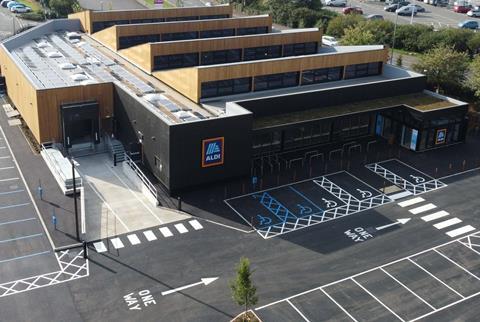
Discounters Lidl and Aldi are having their store opening plans consistently disrupted by planning objections from a number of major rivals.
With financially pressed shoppers already switching to the discounters in their droves due to the cost of living crisis, the objections are thwarting their ability to serve yet more in new areas.
The actions are sometimes in the form of a judicial review challenge brought after the plans have been given the go-ahead, forcing councillors to reconsider.
It can add years to a process already taking up to 18 months – about twice as long as it did pre-pandemic, with delays also blamed on under-resourced council planning departments and building material shortages.
Aldi’s planning applications have been subject to 77 competitor objections since 2020 – approaching the number of stores it will have opened in the period – and 12 judicial reviews.
Lidl is experiencing a similarly high rate of challenges in what is seen as a pattern of competitor legal actions against its plans across the country, but no judicial review challenge has ultimately stopped a store from progressing to date.
Examples include applications for both Aldi and Lidl stores in Rugeley, Staffordshire, which were approved in January 2021 but quashed after Tesco sought a judicial review, arguing town centre impact had not been properly considered. The plans were approved again this July, subject to certain restrictions and after further information was provided by the applicants.
In October last year, an application for a Lidl in Gillingham, Kent, was approved for a fourth time, having first been cleared in April 2020 and repeatedly reconsidered amid challenges from Asda, which has a larger supermarket across the road from the proposed site.
Asda had argued the Lidl store could harm town centre retailers. Tesco, with a store 3.5 miles away from the proposed site, had raised similar concerns.
Asda also brought a judicial review arguing other locations for the Lidl store had not been assessed properly. The council accepted it had not advised members on whether alternative sites presenting a lower flood risk were reviewed during an earlier debate, and as a result considered 28 alternative sites.
“There might be a few cynics in the world that would think that Asda’s objective here was something to do with their own competitive position rather than the flood risk to the good people of Medway,” said Cllr Stuart Tranter as the plans were approved for the fourth time.
“I feel very comfortable in supporting this application and I very much hope we don’t hear from Asda again.”
The sternest criticism of Asda came from Cllr Martin Potter, who said: “I continue to support this application as I have in principle since it first came to this committee many moons ago. My colleagues are incredibly disappointed in Asda.
“I think they are behaving like gangsters with deep pockets trying to run their rivals out of town, not dissimilar to the Las Vegas mobsters who tried to keep their rivals off the strip back in the day.
“I fully support this store, local people want this store and this should go ahead.”
Read more: ‘They’re using us as a first-stop shop.’ How Aldi is changing the way we shop
Cllr Dan McDonald said: “This isn’t the first time we’ve had this application at this committee and I find it quite a poor show from the competitor here.
“The applicants have jumped every hurdle they can to try and make sure this works and we know the residents want it, we know there is a need, we know the competition is healthy.
“I do not believe anything stops us agreeing on this application. They’ve been waiting too long.”
Lidl in Gillingham finally opened its doors this week.
Two planned Lidl stores - in Downham Market, Norfolk, and Workington, Cumbria - are the subject of live judicial review challenges by Tesco. The Workington plans were first approved in December 2019, and the Downham Market proposals in May this year. In both cases approval was quashed after challenges from Tesco and an outcome has yet to be reached.
Asda told The Grocer it only objected to a planning application if there was merit and if the development would have a negative impact as a result of approval, for example on the environment, highways safety or residential amenities.
It said all businesses were subject to the same level of scrutiny with their planning applications, Asda included.
It also noted that in the case of Lidl’s Gillingham plans, the council accepted Asda’s objection and the applicant then went back and assessed alternative sites – a requirement for all major retail applications.
It said it expected all retailers to go through the same process as Asda itself does.
Tesco said it did not object to the vast majority of competitor planning applications and any objections it did submit were only ever based on material planning considerations. It said it never objected on the basis of loss of trade or simply to delay a competitor’s planning application.
Planning delays were among reasons cited this week by Aldi CEO Giles Hurley for the discounter falling short on a target of 1,000 UK stores by 2022, a milestone it now expects to reach next year.
“Clearly there’s planning, which I have to say has been more challenging than ever during the course of the last two to three years, which I guess is perhaps to be expected because of all the pandemic-related challenges,” he said.
In its 2021 results, announced this week, Aldi sales rose 0.9% to £13.65bn while operating profits fell 79% to £60.2m, with investment in prices and pandemic expenses also blamed.
However, sales have rebounded this year, with Aldi attracting 1.5 million new customers in the 12 weeks to 4 September and overtaking Morrisons as the UK’s fourth biggest grocer, as it achieved a 9.3% market share according to Kantar.



















No comments yet